Yun Janice Lu
On January 4th, 2020, I visited Craig Maynard’s Core Memory venue in South Kingston, Rhode Island for a recital by pianist Yun Janice Lu.
Born in Taiwan, Ms. Lu is currently a postgraduate music student at Yale University. I had never seen her play, but Core Memory hosts excellent artists so I had high expectations.
Shortly before the recital began, I noticed a young woman sitting nearby, reading sheet music on an iPad. It took me a few moments to recognize our soloist, sitting with her audience while preparing.
Beethoven: Piano Sonata No. 24 in F Sharp Major Op. 78
Yun Janice Lu opened with Beethoven’s Piano Sonata No. 24 Op. 78, one of his shortest. (Sir Andras Schiff gave an excellent lecture about this work.)
She played an abbreviated version of the first movement, so the entire sonata lasted less than 8 minutes. It was a good introduction to Ms. Lu’s low-key, immersive approach. From the serene opening of the Adagio to the flirty call-response phrasing of the Allegro vivace, her Beethoven was fluid and convincing.
Prokofiev: Piano Sonata No. 7 in B Flat Major Op. 83
The jagged dissonance of Prokofiev’s Sonata No. 7 was in striking contrast to Beethoven’s harmonious sonata, taking us across time from the Napoleonic wars to World War 2.
Ms. Lu appeared to relish Prokofiev’s edgy rhythms, at times rising from the bench with her hair flying. It was a striking performance that mesmerized the audience. Afterwards, someone commented that her fingers must be glowing.
Despite the virtuosity that Prokofiev demands, Janice most impressed me in the opening of the second movement. Here, Prokofiev sets aside his personal idiom and borrows a progression from Schumann’s “Wehmut”, composed a century earlier. This was rendered with haunting beauty by Ms. Lu, as you can hear in the following audio snippet.
Schumann: Kreisleriana Op. 16
There was a lot to like in Yun Janice Lu’s Kreisleriana. My favorite part was the second movement (“Sehr innig und nicht zu rasch”), which contains one of Schumann’s most beautiful melodies.
Here Ms. Lu’s graceful phrasing and artful pedal painted Schumann’s intertwining voices on a rapturous canvas of harmonics that seemed to rise over us.
Encore: Ravel Jeux d’Eau
Watching Ms. Lu’s nimble performance of Ravel’s melodious work, it seemed that she really liked it. At least once, a hint of a smile crossed her face. And a couple of times Ravel really got her bicycling (see Closing Thoughts).
Encore: Debussy Etude No. 11
New to me, Debussy’s Etude No. 11 was full of `sound-alike moments reflecting rhythms and harmonies from his other compositions. Like the preceding Ravel, Ms. Lu seemed to have a special affinity for this work and gave an evocative performance, full of impressionist sparkle.
Closing Thoughts
I greatly enjoyed our time with Yun Janice Lu. Sociable and at ease in the spotlight, she is not the kind of pianist to swagger at the keyboard or cue her audience on what to feel. Her performance had an unforced, natural flow, and she had a way of making everything look easy.
The only expressive flair that I noticed from Janice was her “bicycle”, which seemed to come out mostly during musical peaks. You can see it in the following snippet from her Beethoven.
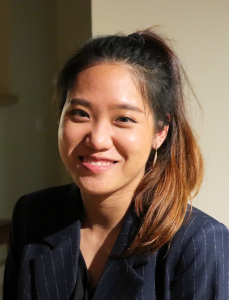
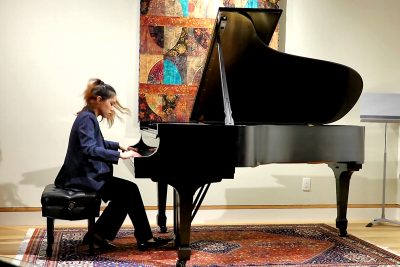
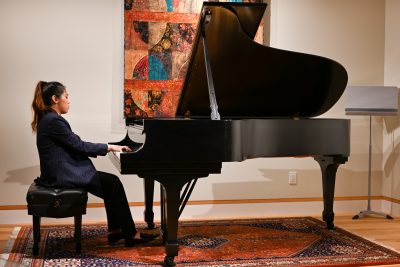
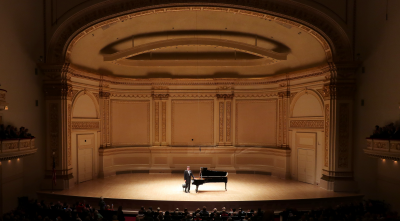
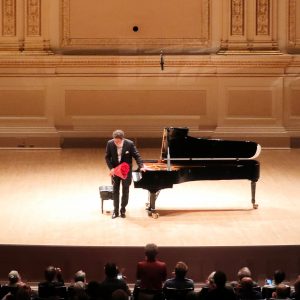
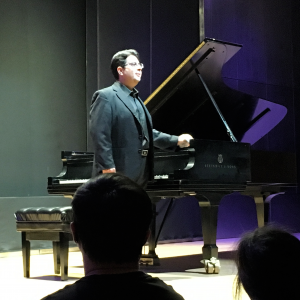
You must be logged in to post a comment.